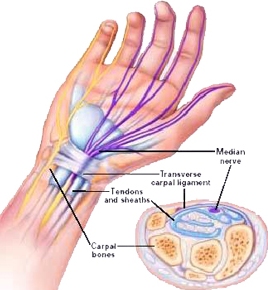Risk Factors and Prevention of Carpal Tunnel Syndrome:
Carpal Tunnel Syndrome (CTS) is a painful and often debilitating disorder of the wrist and hand. The carpal tunnel is a narrow tunnel formed by bones and other tissues on the palm side of your wrist. Within this tunnel runs the median nerve. When the median nerve is compressed or pinched this can lead to CTS. CTS occur when the surrounding tissues in the carpal tunnel, such as ligaments and tendons, get swollen or inflamed and press against the median nerve. This usually results with repetitive motion of the wrist and hand. However, it may also be linked to other factors, such as injury to the wrist such as a fracture.
- Computer users
- Grocery checkers
- Meat packers
- Violinists
- Mechanics
- Pregnant women
- People diagnosed with diabetes
- Rheumatoid arthritis
- Thyroid disease
Diagnosis of Carpal Tunnel Syndrome
CTS are often diagnosed with a detailed history taken either by your doctor or physical therapist. Special tests are then performed to confirm or rule out CTS. If appropriate, a nerve conduction velocity test (NCV) or electromyography (EMG) may be ordered by your doctor to see if the nerves and muscles in your arm and hand show the typical effects of CTS.
Symptoms of Carpal Tunnel Syndrome
- Numbness and tingling in your hand and fingers (especially the thumb, index and middle finger)
- Pain in your wrist, palm or forearm
- Above symptoms are usually greater during the night or with prolonged repetitive motion of the wrist and hand
- Difficulty gripping objects and weakness in the thumb
Treatment of Carpal Tunnel Syndrome
If CTS is caused by a medical problem your doctor will most likely treat that problem which should help relieve symptoms. Your doctor may also prescribe medication to help decrease inflammation. The anti inflammatory can be administered orally or by way direct injection. Your physical or occupational therapist can also play an integral role by using the appropriate interventions to help loosen the tissue surrounding the median nerve and decrease inflammation.
Prevention of Carpal Tunnel Syndrome
Yes, by utilizing some of the tips below you may decrease your likelihood of developing CTS.
- Get treatment for any of the diseases listed that predisposes you to CTS
- Avoid doing the same repetitive movements of the wrist and hand for long periods of time
- Don’t rest your wrists on hard surfaces for long periods
- Try to switch hands during work tasks and make sure your tools are appropriate for your hand size
- Take regular breaks from repeated hand movements
Hand injuries can be caused in many different ways including work injuries, auto injuries, sport injuries, and simply overuse of the muscles causing dysfunction, chronic, and acute pain. We have Certified Hand Therapist in our Laurel and Clinton locations. Call now for Best Hand Therapy Treatment: 301-498-1604 or Visit: http://www.active-physicaltherapy.com
